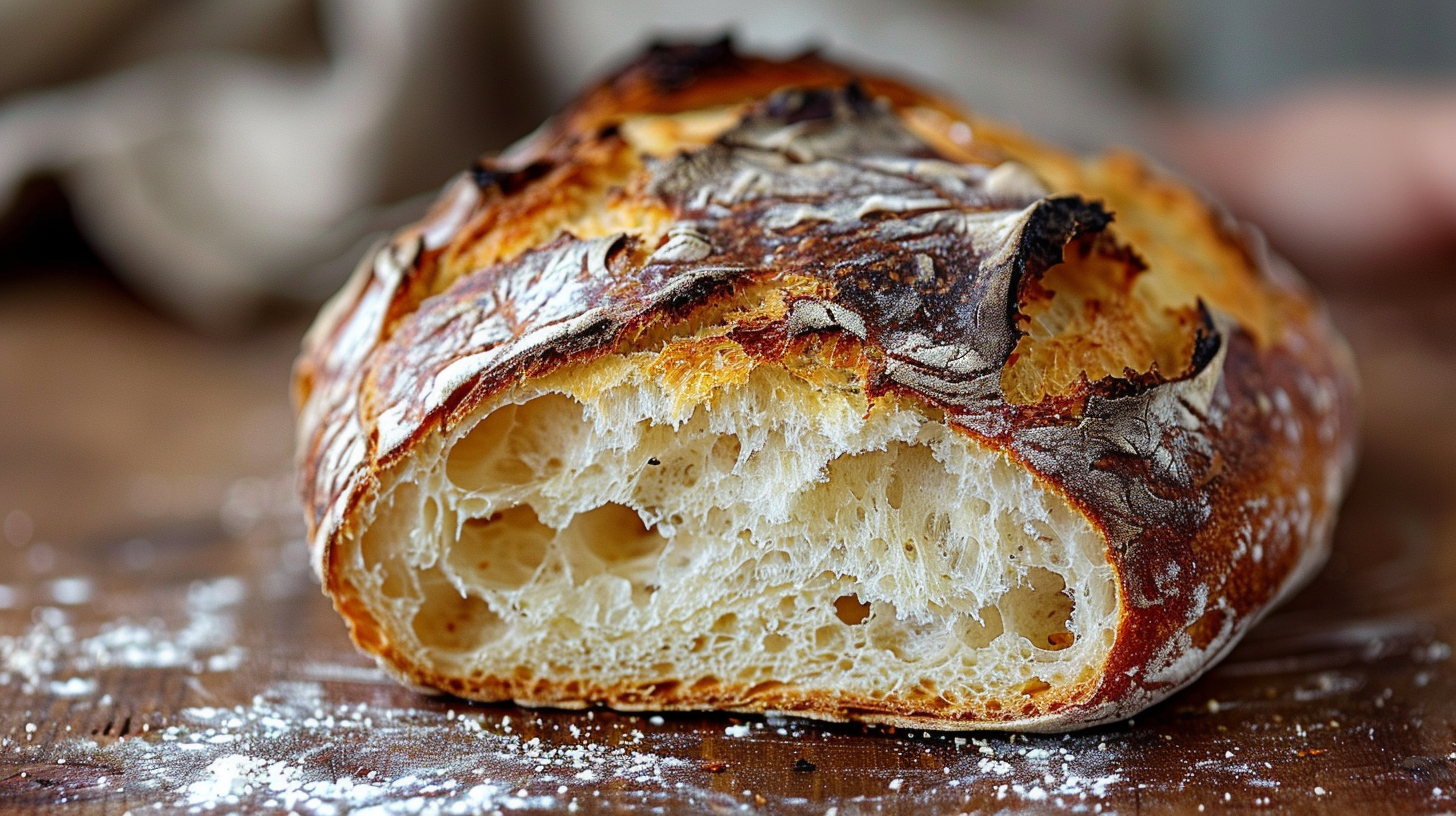Why is sourdough bread not fattening?
Sourdough bread has gained widespread popularity in recent years, not only for its unique flavor but also for its numerous health benefits. Unlike traditional bread, sourdough is made using a natural fermentation process that involves a starter of flour and water, rich in wild yeast and bacteria. This process increases its nutritional value, making it a healthier option for those looking to maintain a balanced diet.
But why sourdough bread is not fattening? The secret lies in its unique composition, which supports weight management and overall well-being. Whether you’re a bread lover or just health-conscious, understanding what makes sourdough bread special can revolutionize how you think about carbs.
Nutritional Profile of Sourdough Bread
The nutritional makeup of sourdough bread plays a significant role in its health benefits. Compared to regular bread, sourdough is a rich source of nutrients like:
- Vitamins: B vitamins, especially folate, which supports energy production and cellular function.
- Minerals: Magnesium, potassium, and zinc.
- Fiber: Promotes digestive health and aids in blood sugar control.
It’s also lower in fat and calories compared to many commercial bread options, which contributes to the keyphrase: Why is sourdough bread not fattening? Its nutritional density insures that you’re consuming a filling food that supports, rather than hinders, your dietary goals.
Unique Fermentation Process

Sourdough bread owes its distinct advantages to its fermentation process. Unlike bread made with commercial yeast, sourdough uses a natural starter that ferments the dough over an extended period. This process:
- Breaks down phytic acid, increasing the availability of nutrients.
- Increases the bread’s digestibility.
- Reduces gluten content, making it a better choice for those with mild gluten sensitivities.
The fermentation also creates a balance of acidity that inhibits the growth of harmful bacteria. These factors together explain why sourdough is easier on the stomach and may even contribute to weight management by promoting better digestion and nutrient absorption.
Lower Glycemic Index
One of the primary reasons why sourdough bread is not fattening is its low glycemic index (GI). The GI measures how quickly a food raises blood sugar levels. Sourdough’s GI is significantly lower than that of traditional bread because:
- The fermentation process alters the structure of carbohydrates.
- Slower digestion leads to more stable blood sugar levels.
By preventing blood sugar spikes, sourdough bread reduces cravings and helps regulate insulin levels. For individuals looking to maintain or lose weight, this property makes it a more suitable choice compared to conventional white or even whole-grain bread.
For tips on making the most of sourdough’s benefits, you can avoid common pitfalls by following this guide to avoid sourdough mistakes.
Better Digestibility
Another standout feature of sourdough bread is its improved digestibility. The fermentation process partially breaks down gluten and starches, making the bread easier to process. Many people with mild gluten intolerances find sourdough a suitable alternative.
Improved digestibility is directly tied to the question of why sourdough bread is not fattening. Foods that are easier to digest reduce the likelihood of bloating and inefficient nutrient absorption, both of which can contribute to weight gain. Furthermore, better digestion supports a healthier gut microbiome, essential for overall well-being.
For breakfast enthusiasts, sourdough discard can also be repurposed into delicious meals. Learn more from these sourdough discard breakfast recipes.
Natural Ingredients
Unlike commercially processed bread, sourdough relies on a few simple ingredients: flour, water, and salt. There are no artificial preservatives, sweeteners, or additives that can increase calorie content or confuse metabolic health. This minimalistic approach:
- Insures a cleaner label with fewer processed elements.
- Reduces the likelihood of consuming empty calories.
By eliminating unnecessary ingredients, sourdough aligns with a natural and health-conscious lifestyle, reinforcing the idea of why sourdough bread is not fattening. It’s a pure, whole-food option that fits well into a balanced diet.
Satiety and Portion Control
Sourdough bread is naturally more filling than most bread varieties, thanks to its dense texture and nutritional composition. The combination of fiber, protein, and a low glycemic index promotes a feeling of fullness, which helps with portion control.
This is a crucial factor in understanding why sourdough bread is not fattening. Eating less due to increased satiety means fewer calories consumed overall. Some key points to note include:
- A single slice of sourdough can be more satisfying than two slices of conventional bread.
- Its slow-release energy keeps hunger at bay for longer periods.
By naturally reducing the desire to overeat, sourdough supports weight management without requiring drastic dietary changes.
For breakfast enthusiasts, sourdough discard can also be repurposed into delicious meals. Learn more from these sourdough discard breakfast recipes.
Probiotic Benefits
The fermentation process that creates sourdough bread also yields probiotic compounds that benefit gut health. While the baking process eliminates live probiotics, the bread still contains prebiotics—compounds that feed beneficial gut bacteria. A healthy gut microbiome:
- Aids in digestion and nutrient absorption.
- Helps regulate appetite and metabolism.
- Reduces inflammation, which can otherwise contribute to weight gain.
These probiotic benefits are another reason why sourdough bread is not fattening. By supporting a balanced gut environment, sourdough promotes efficient digestion and reduces the likelihood of storing excess calories as fat.
A Bread That Supports Your Goals
When comparing sourdough to other bread options, it’s clear that its unique fermentation process, natural ingredients, and low glycemic index make it a healthier choice. The keyphrase why sourdough bread is not fattening becomes evident when you consider its ability to:
- Support stable blood sugar levels.
- Increase digestion and nutrient absorption.
- Promote satiety and portion control.
By choosing sourdough, you’re not only indulging in a delicious and wholesome bread but also making a choice that aligns with your health and weight management goals. Whether toasted, topped, or paired with your favorite meal, sourdough remains a versatile and nutrient-packed staple for the health-conscious individual.
Certainly! Below is the formatted article as per your instructions:
Calories in Sourdough Bread
Sourdough bread stands out for its relatively low-calorie content compared to other bread types. On average, one slice of sourdough bread contains 80–120 calories, depending on the recipe and size of the slice.
- The fermentation process in sourdough reduces the carbohydrate density, making it easier for the body to process.
- Unlike highly refined white bread, sourdough provides complex carbohydrates that are digested more slowly, preventing sharp blood sugar spikes.
When asking “Why is sourdough bread not fattening?”, it’s essential to consider its caloric content combined with its ability to provide long-lasting energy without unnecessary additives.
Impact on Insulin Resistance
One of the most compelling benefits of sourdough bread lies in its effect on insulin resistance. The fermentation process creates lactic acid bacteria that lower the glycemic index of the bread.
Why is this significant?
- A lower glycemic index means sourdough bread releases glucose into the bloodstream at a slower pace.
- Consuming sourdough bread may improve blood sugar control, especially in individuals with prediabetes or diabetes.
Studies show that incorporating sourdough bread into a balanced diet can help stabilize insulin levels. The keyphrase “Why is sourdough bread not fattening?” aligns with this evidence, as stable blood sugar levels prevent overeating and excessive fat storage.
Role of Acidic Environment
The acidic environment in sourdough bread is a direct result of its natural fermentation process. This acidity:
- Increases nutrient absorption, particularly for minerals like iron, zinc, and magnesium.
- Helps lower the glycemic response by slowing down digestion.
- Promotes a healthy gut microbiome, which plays a vital role in maintaining a balanced metabolism.
When considering “Why is sourdough bread not fattening?”, the acidic nature of sourdough contributes to better digestion and metabolism regulation, reducing the likelihood of fat accumulation.
Common Misconceptions
“All bread is bad for weight management.”
This is a myth. While some bread varieties are calorie-dense and nutrient-poor, sourdough offers a nutrient-rich alternative with fewer processed ingredients.
“Sourdough is just another type of white bread.”
Wrong! Sourdough differs due to its fermentation process, which increases its nutritional profile and digestibility. It’s an excellent option for those asking “Why is sourdough bread not fattening?”.
“Sourdough bread is gluten-free.”
Although sourdough contains less gluten than traditional bread, it is not entirely gluten-free unless made specifically with gluten-free flours.
Sourdough in a Balanced Diet
Incorporating sourdough bread into a balanced diet can be a smart choice for weight management. Here’s how:
- Pair it with protein-rich foods like eggs or lean meats to create a well-rounded meal.
- Add healthy fats such as avocado or olive oil to further slow digestion and improve satiety.
- Use sourdough as a base for nutrient-dense toppings like hummus, leafy greens, or smoked salmon.
By balancing sourdough with nutrient-rich ingredients, you can maximize its benefits while addressing concerns like “Why is sourdough bread not fattening?”.
Practical Tips for Choosing Sourdough

Not all sourdough is created equal. When shopping, consider these tips to assure you’re getting the healthiest option:
- Look for authentic sourdough: Check labels to confirm that the bread is made using traditional fermentation methods.
- Avoid added sugars: Some commercial brands include unnecessary sweeteners, which can increase the calorie content.
- Choose whole-grain varieties: Whole-grain sourdough provides more fiber, which supports weight management and gut health.
- Inspect the ingredient list: A short, simple list typically indicates a more natural product.
Understanding these factors insures that the sourdough bread you choose aligns with the question: “Why is sourdough bread not fattening?”.
FAQs About Sourdough Bread and Weight
Is sourdough bread good for weight loss?
Yes, sourdough bread is less likely to contribute to weight gain because of its lower glycemic index and nutrient density.
Can sourdough bread cause bloating?
For most people, the fermentation process makes sourdough easier to digest, reducing bloating and discomfort.
Why is sourdough bread not fattening compared to other bread?
The unique fermentation process lowers its glycemic index, improves nutrient absorption, and supports better digestion—all factors that help with weight management.
How much sourdough bread can I eat without gaining weight?
Portion control is crucial. Stick to 1–2 slices per meal, paired with protein and vegetables, to maintain balance.
Sourdough bread is a nutrient-rich, low-calorie option that fits well into a weight-conscious diet. From its lower glycemic index to its beneficial acidic environment, sourdough offers a variety of advantages for those asking “Why is sourdough bread not fattening?”. By understanding its unique properties and making informed choices, you can enjoy sourdough as part of a balanced and healthy lifestyle.

